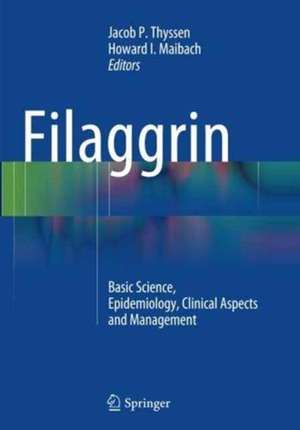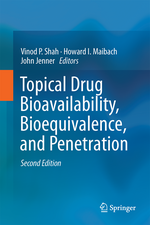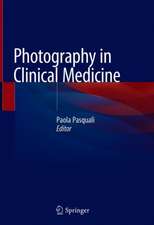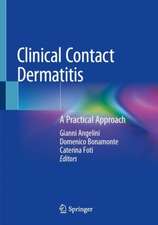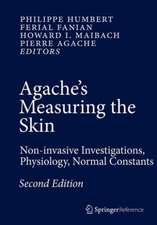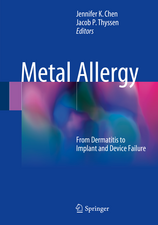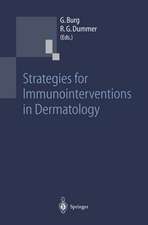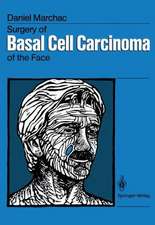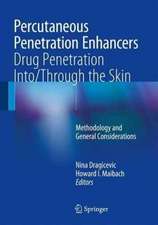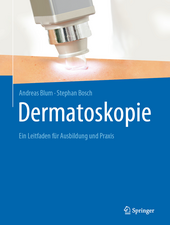Filaggrin: Basic Science, Epidemiology, Clinical Aspects and Management
Editat de Jacob P. Thyssen, Howard I. Maibachen Limba Engleză Paperback – 23 aug 2016
| Toate formatele și edițiile | Preț | Express |
|---|---|---|
| Paperback (1) | 607.28 lei 38-45 zile | |
| Springer Berlin, Heidelberg – 23 aug 2016 | 607.28 lei 38-45 zile | |
| Hardback (1) | 739.85 lei 3-5 săpt. | |
| Springer Berlin, Heidelberg – 24 iun 2014 | 739.85 lei 3-5 săpt. |
Preț: 607.28 lei
Preț vechi: 639.24 lei
-5% Nou
Puncte Express: 911
Preț estimativ în valută:
116.22€ • 121.18$ • 96.59£
116.22€ • 121.18$ • 96.59£
Carte tipărită la comandă
Livrare economică 17-24 martie
Preluare comenzi: 021 569.72.76
Specificații
ISBN-13: 9783662511176
ISBN-10: 3662511177
Pagini: 388
Ilustrații: XV, 373 p. 160 illus., 82 illus. in color.
Dimensiuni: 178 x 254 mm
Ediția:2014
Editura: Springer Berlin, Heidelberg
Colecția Springer
Locul publicării:Berlin, Heidelberg, Germany
ISBN-10: 3662511177
Pagini: 388
Ilustrații: XV, 373 p. 160 illus., 82 illus. in color.
Dimensiuni: 178 x 254 mm
Ediția:2014
Editura: Springer Berlin, Heidelberg
Colecția Springer
Locul publicării:Berlin, Heidelberg, Germany
Cuprins
BASIC SCIENCE: Mutations in the Filaggrin Gene.- Morphology of Normal and Filaggrin Depleted Epidermis.- Function of Filaggrin and Its Metabolites.- Influence On Skin Lipids.- Inflammatory Driven Depletion of Filaggrin Proteins.- Animal Models.- In Vitro Models.- EPIDEMIOLOGY: Prevalence Rates In Different Races.- Gene-Environment Interactions.- Heterozygous Advantage.- FILAGGRIN AND SKIN DISEASE: Ichthyosis Vulgaris and Other Disorders of Cornification.- Atopic Dermatitis.- Allergic Contact Dermatitis.- Irritant Contact Dermatitis.- Hand Eczema.- Psoriasis.- Disorders In The Seborrheic Areas.- Infections.- Cancer and Tumors.- Autoimmune and Connective Tissue Disorders.- Pigmentation Disorders.- Sweat Gland Disorders.- Nails and Hair.- FILAGGRIN AND NON-CUTANEOUS DISEASE: Asthma.- Rhinitis.- Food Allergy.- Diabetes.- Cardiac Disease.- Inflammatory Bowel Disease.- Ophthalmic Disease.- Rheumatoid Arthritis.- Cancer.- Vitamin D.- MANAGEMENT.
Notă biografică
Jacob Thyssen has worked in Dermatology for 10 years and holds PhD and DmSci degrees from the University of Copenhagen. He has published 190 articles and 10 book chapters. He has received international awards for his research, including the LEO Pharma Research Foundation for best investigator <45 years in the Nordic countries. His research has focused on dermatitis, allergies, and the skin barrier. He has been a research fellow in the USA, visiting Harvard Medical School and UCSF. He is a regular speaker at international meetings. Jacob Thyssen enjoys treating patients with dermatitis on a daily basis in the Gentofte Clinic in Copenhagen, Denmark.
Textul de pe ultima copertă
Filaggrin proteins are expressed in several human tissues, including the skin, oral mucosa, conjunctivae, esophagus, cervix, and testes. While filaggrin guarantees both structural and functional normality of the human epidermis, its role in other tissues is largely unknown. Epidermal deficiency of filaggrin causes dry and scaly skin, but also strongly increases the risk of skin diseases, in particular ichthyosis vulgaris and atopic dermatitis. Importantly, the risk of related asthma, hay fever, and food allergy is also increased although filaggrin is not expressed in the airways and gastrointestinal tract.
Common FLG mutations, leading to reduced filaggrin expression, have mainly been identified in Europeans and Asians, reaching a prevalence of 5-10%. Even in the absence of atopic dermatitis, the skin of individuals with FLG mutations differs fundamentally from normal skin, for example by generating more vitamin D and allowing chemicals and allergens to more widely penetrate across the stratum corneum.
This textbook provides comprehensive and detailed coverage of the effects of filaggrin and filaggrin gene (FLG) mutations in health and disease (cutaneous and non-cutaneous) and also discusses the basic science, epidemiology, management, and future research areas. It will be of value to scientists and clinicians from different specialties.
Common FLG mutations, leading to reduced filaggrin expression, have mainly been identified in Europeans and Asians, reaching a prevalence of 5-10%. Even in the absence of atopic dermatitis, the skin of individuals with FLG mutations differs fundamentally from normal skin, for example by generating more vitamin D and allowing chemicals and allergens to more widely penetrate across the stratum corneum.
This textbook provides comprehensive and detailed coverage of the effects of filaggrin and filaggrin gene (FLG) mutations in health and disease (cutaneous and non-cutaneous) and also discusses the basic science, epidemiology, management, and future research areas. It will be of value to scientists and clinicians from different specialties.
Caracteristici
First book to be devoted to the subject Comprehensive overview of the effects of FLG mutations in health and disease Wide appeal to the many different specialties that work with this area
